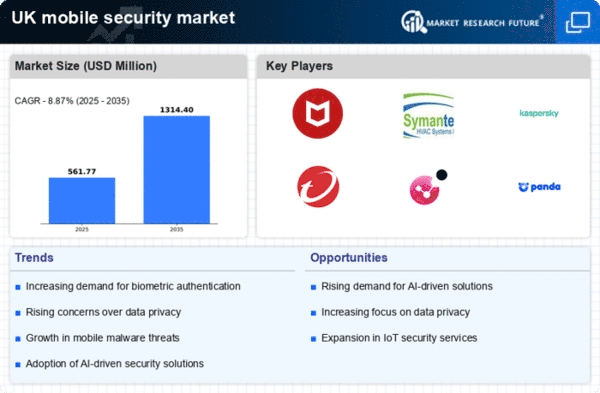Surge in Mobile Device Usage
The rapid increase in mobile device usage across various demographics in the UK appears to be a primary driver for the mobile security market. As of 2025, approximately 85% of the UK population owns a smartphone, leading to heightened concerns regarding data breaches and cyber threats. This surge in mobile device adoption necessitates robust security measures to protect sensitive information. Consequently, businesses and individuals are increasingly investing in mobile security solutions to safeguard their devices against potential vulnerabilities. The mobile security market is projected to grow significantly, with estimates suggesting a compound annual growth rate (CAGR) of around 12% over the next five years. This growth is likely fueled by the need for enhanced security protocols as mobile devices become integral to daily operations and personal communications.
Evolving Cyber Threat Landscape
The evolving landscape of cyber threats is a critical factor influencing the mobile security market. With cybercriminals continuously developing sophisticated techniques to exploit vulnerabilities, the demand for advanced security solutions is escalating. In the UK, reports indicate that mobile malware attacks have increased by over 30% in the past year alone, prompting organizations to reassess their security strategies. The mobile security market is responding to this challenge by offering innovative solutions that address emerging threats, such as ransomware and phishing attacks. As businesses recognize the potential financial and reputational damage caused by security breaches, investments in mobile security technologies are expected to rise. This trend underscores the necessity for comprehensive security frameworks that can adapt to the dynamic nature of cyber threats.
Consumer Awareness and Education
Consumer awareness regarding mobile security risks is steadily increasing, which is positively impacting the mobile security market. As individuals become more informed about the potential threats associated with mobile device usage, there is a growing demand for security solutions that can protect personal data. Educational campaigns and resources provided by government agencies and private organizations in the UK have contributed to this heightened awareness. Surveys indicate that nearly 70% of consumers are now actively seeking mobile security applications to safeguard their devices. This shift in consumer behavior is likely to drive market growth, as businesses respond to the demand for user-friendly security solutions. The mobile security market is expected to expand as more individuals prioritize their digital safety and invest in protective measures.
Regulatory Pressures and Compliance
Regulatory pressures and compliance requirements are increasingly shaping the mobile security market. In the UK, stringent data protection regulations, such as the General Data Protection Regulation (GDPR), mandate that organizations implement robust security measures to protect personal data. Non-compliance can result in hefty fines, which has prompted businesses to prioritize mobile security solutions. As organizations strive to meet these regulatory standards, the mobile security market is likely to experience significant growth. Companies are investing in comprehensive security frameworks that not only comply with regulations but also enhance their overall security posture. This trend indicates a shift towards a more proactive approach to mobile security, where compliance is viewed as an integral part of business strategy rather than a mere obligation.
Integration of Artificial Intelligence
The integration of artificial intelligence (AI) into mobile security solutions is transforming the market landscape. AI technologies enable the development of proactive security measures that can detect and respond to threats in real-time. In the UK, companies are increasingly leveraging AI-driven analytics to enhance their mobile security protocols. This trend is likely to drive the mobile security market as organizations seek to automate threat detection and response processes. By employing machine learning algorithms, security systems can identify patterns and anomalies, thereby improving their ability to thwart potential attacks. The market is projected to witness a substantial increase in AI-based security solutions, with estimates suggesting a growth rate of approximately 15% annually. This integration not only enhances security but also streamlines operations, making it a compelling driver for the mobile security market.
















